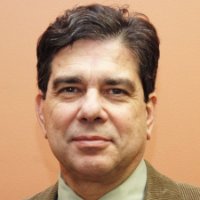Refugees International President Michel Gabaudan came to Georgetown’s campus on Wednesday, Feb. 17, to speak about the ongoing global refugee crisis. As a former member of the United Nations High Commission on Refugees (UNHCR), Gabaudan both explained and commented on the catastrophe that has been headlining newspapers for more than a year now, arguing that.
Forced displacement has become a global crisis that implicates the whole world and not just war-torn regions. Gabaudan opened the event by comparing the crisis to other prevalent issues today such as climate change. Statistics certainly support this claim: according to Gabaudan, the number of displaced people in the world is currently 60 million—the same number of people that were displaced in the Second World War.
“Why is this the case?” Gabaudan asked. The French native listed some of many countries that are currently in the midst of war: Iraq, Nigeria, Central African Republic, Yemen, and Syria. Gabaudan argues, however, that these staggering numbers are not the reason that the refugee crisis has received so much attention.
“The day [the refugees] started moving to Europe, [the refugee crisis] became an issue,” he said. Gabaudan reminded audience members that only one million have successfully reached Europe, while a quarter of Lebanon’s population is made up of refugees.
European immigration, however, was not the reason Gabaudan came to speak, he said. The president of Refugees International explained that the main point of his talk was to “to remind people who refugees are.”
Of the 60 million displaced in the world, 20 million are refugees. Eighty-six percent of these refugees live in the poorest countries in the world. Gabaudan said that we must keep in mind that most displaced people cannot afford to move elsewhere, namely Europe. “The West blissfully forgets that the majority live elsewhere,” he said.
Gabaudan then discussed the different kinds of displacement. The first is climate displacement. According to Gabaudan, an average of 26 million people each year suffer from climate-induced displacement.
Climate disasters are much easier to predict than conflict, he said, and therefore, much easier to combat. He explained that while working at the UN, he and his colleagues often tried to predict the next place of conflict. Gabaudan described a scene of UN employees huddled around a map of the world, each with a pushpin in hand.
“We almost always got it wrong,” Gabaudan said.
The next type of displacement results from gang violence. In the case of Mexico, there are 300,000 internally displaced people as of December 2014. The Mexican government, however does not recognize this conflict, he said,. Gabaudan then discussed the cases of Guatemala and El Salvador; countries that are left incapacitated by gang violence.
After addressing the different kinds of displacement in the world, Gabaudan detailed the existing ways of response. According to the Gabaudan, only the United States, the EU, Scandinavia, Japan, and Australia provide funds. Gabaudan explains that this leads to an exclusion of country-specific values in the decision-making process. He urged the UN and other international organizations to work closely with local NGOs to widen funding beyond these few, mainly Western, countries.
Gabaudan concluded his speech by stating that the “problem” portrayed on the news—refugees moving into Europe—is far from over. “Sixty-five thousand people moved from Turkey to Greece [in February],” he said, and suggested that migration into Europe will only increase with warm weather.
Audience members agreed with Gabaudan’s overall message. Benjamin Forestier (MSB ’16), a member of Lecture Fund who organized the event, explained that he invited Gabaudan to speak because he “thought it was relevant to our campus.” He hopes that it increased student dialogue on the issue. “No one in the MSB talks about this,” he said.
Christina Johnson (SFS ’17), who attended the lecture, also said that the refugee crisis is not talked about enough on campus. “My friends and I never talk about it,” she said it.
William Todman (MA Arabic Studies ’16) started Georgetown Refugee Action this semester in order to combat the campus-wide silence on the issue. His organization also hopes to ultimately work with the administration to provide scholarships to displaced refugees. Todman explained that he thought Gabaudan raised “interesting points on how the international community can be responding.”
As Gabaudan reminds audience members with his closing statement: “We all need to join forces to keep the issue alive.”






Miss reading ya!